Königsberger Bicycles
One hundred years ago, in 1921, the athlete and entrepreneur Franz Todtenhöfer created the "Union of Bicycle Paths" (Verein für Fahrradwege) in Königsberg. Thanks to this organization, bicycle paths appeared along the city streets. To this day, historical bicycle paths in Kaliningrad have been preserved only on Karl Marx Street.
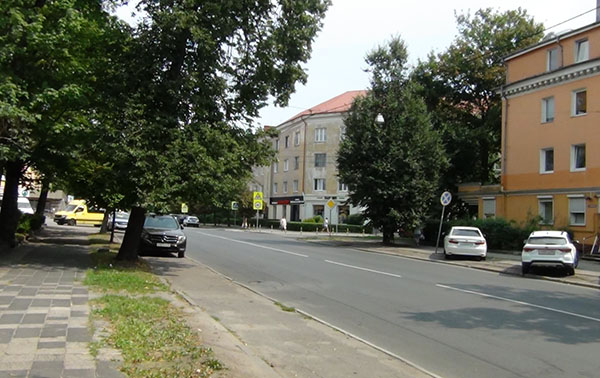
Althoff's company is a pioneer in bicycle sales in Königsberg
In 1881, merchant Hermann Althof opened a bicycle shop at 5 Paradeplatz. His shop was located in the very center of the city opposite the Albertina University building (now the Kant Baltic Federal University building on Universitetskaya Street). Very soon, the new two-wheeled personal transport gained popularity among the city residents. A few years later, in 1884, the German Cycling Federation was founded. Thus, in 1886, the Königsberg Bicycle Club was created in the capital of the East Prussian province. A year later (in 1887), the Adler (Orel) Bicycle Club opened in Insterburg (now the city of Chernyakhovsk). The great demand that emerged among the residents of Königsberg for the purchase and maintenance of bicycles served as a good development for Hermann Althof's business. By the end of the 19th century, near house No. 11 on Steindamm, not far from the then gate of the same name leading out of the city, he opened a large showroom for cycling and a repair shop. In 1895, at the German North-Eastern Industrial and Crafts Exhibition in Königsberg, bicycles from Hermann Althoff were awarded a medal. In 1899, Hermann Althoff, together with an entrepreneur named Politt, founded the "Königsberg Bicycle Factory". On land plot No. 55 in Hufen on Bahnstrasse, the production buildings of this enterprise were erected. In 1901, the Königsberg Bicycle Factory "Baltiya" began production of its products.
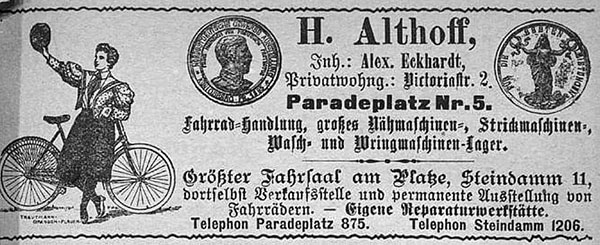
In post-war Kaliningrad, the premises of the Baltia bicycle factory were converted into a repair and mechanical plant. This enterprise operated until 2015, after which the production buildings were dismantled and four 9-story apartment buildings were built in their place on Kosmonavta Leonova Street.
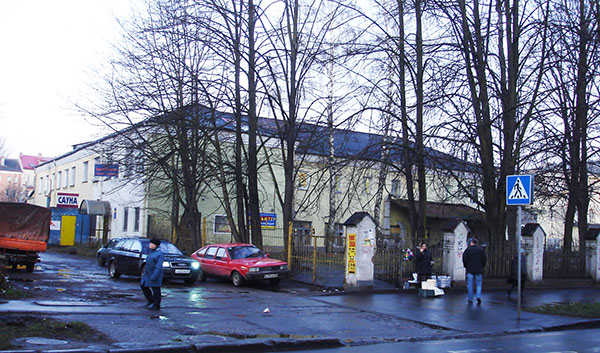
"Polo" - the second bicycle of Königsberg

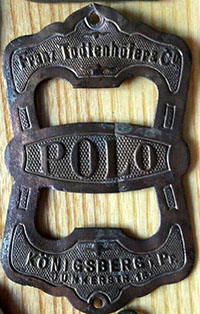
In 1905, another brand of bicycle appeared on the streets of Königsberg - the Polo, the production of which was established by the cyclist and entrepreneur Franz Todtenhöfer. On the steering column of this iron "horse" there was an emblem (shield) with an image of a rider playing polo. Also used as an emblem of this brand of bicycle was a simpler brass plate indicating the name of the owner Franz Todtenhöfer and the address of the company's location in house No. 16 on Junkerstrasse in Königsberg.
Franz Todtenhöfer, a very extraordinary person, deserves more details. He was born on August 13, 1875 in Königsberg. He became interested in cycling as a child and remained faithful to it throughout his life, although he often traveled by car for work. He achieved his first success in cycling while still a student at the Albertina. In 1893, at the age of 18, Franz became the champion of East Prussia in one of the cycling disciplines. Two years later, Franz Todtenhöfer, together with his brother-in-law (his sister's husband) Max Rauthensperger, opened a bicycle shop in house No. 16 on Junkerstrasse. This was made possible by the fact that Franz's father gave each of his three children a large sum of money at that time - 10,000 marks.
In 1901, Todtenhöfer & Co. was first listed in the Königsberg address books. At this time, before the Polo was produced, the company sold bicycles from one of the first German bicycle manufacturers, Bielefelder Dürkopp-Werke. In addition to bicycles, Dürkopp produced sewing machines, and Franz Todtenhöfer, like many others at the time, sold sewing machines in his shop along with bicycles.
In 1897, bicycle paths were laid out at the Tiergarten tennis stadium, located in the northern part of the Königsberg Zoo.
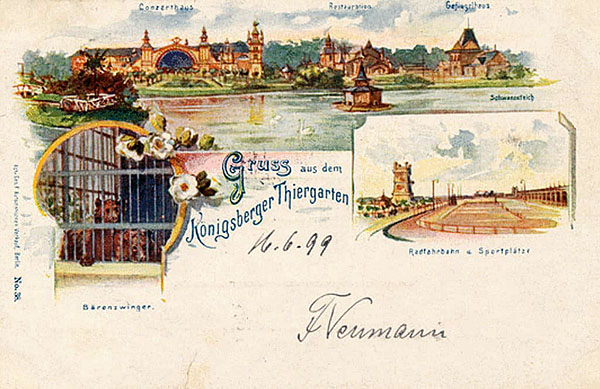
Since then, cycling competitions have been held there. Now it is the Trud stadium on Tchaikovsky Street in Kaliningrad.
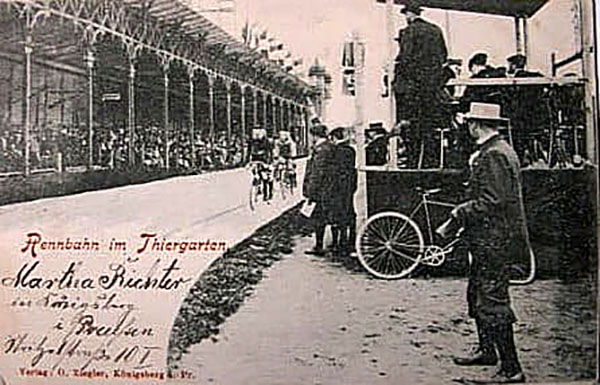
In 1898 and 1899, Todtenhöfer took 2nd and 3rd place in the cycling competitions in Königsberg. In 1899, he was the first rider of the Königsberg cycling club (of which, by the way, there were 16 in the city), and continued to participate in cycling races in East Prussia. In 1906, Todtenhöfer was elected (the second) chairman of the Königsberg cycling club.
Since 1902, the company "Franz Todtenhöfer & Co." also began selling Fiat, Mercedes, and Opel cars. Over time, the company became the general representative of the Opel plant for West and East Prussia, Danzig, and the entire Baltic region. Things were going well, and in 1906 the organization moved to house No. 142/143 on Steindamm, where, in addition to the office and retail space, there were also car repair shops. Totdenhöfer's interests also included the sale of NSU (Germany) and Saroléa (Belgium) motorcycles. Franz took part in the first NSU motorcycle races. In 1904, in Kolberg (now Kołobrzeg), he was elected as the 2nd chairman of the "Association of German Motorcyclists" (DMV), the predecessor of the well-known ADAC ("Association of German Motorcyclists"), in Pomerania, West and East Prussia. In 1914, he was elected vice-president of the "East German Automobile Club" founded in 1905 in Königsberg. Among other things, Todtenhöfer had a hand in the appearance of some of the first taxis in Königsberg, for which 15 Opels were purchased back in 1913.
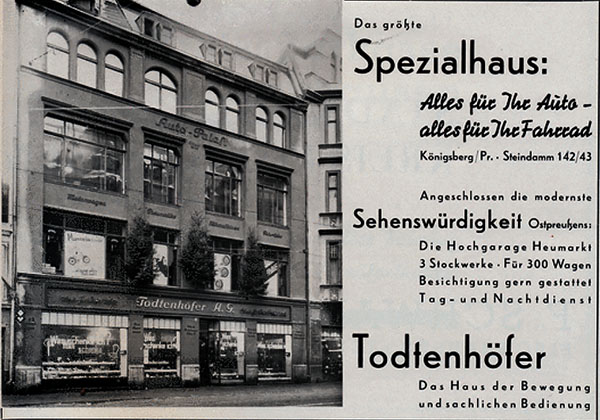
In 1915, Franz became the sole owner of Franz Todtenhöfer & Co.
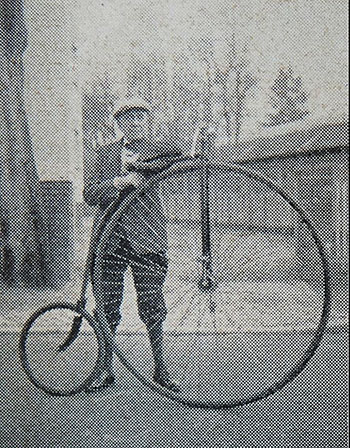
In 1927, the company was transformed into a joint-stock company, Todtenhöfer AG. The company's headquarters were moved to Berlin, where Totdenhöfer had either an office or a branch since 1921, through which auto parts were sold. But Königsberg still remains the company's production center. Here, on the Heumarkt (Hay Market), a 3-story garage for 350 cars was built. There was a car repair shop under the garage. In Kaliningrad, the premises of this garage were used to park ambulances. Now the building houses the Barnaulsky shopping center, located on the street of the same name.
The Todtenhöfer company also owned several garages in Königsberg, and had branches in Allenstein (now Olsztyn) and Kovno (now Kaunas).
"Mazovia" - a new brand of bicycle
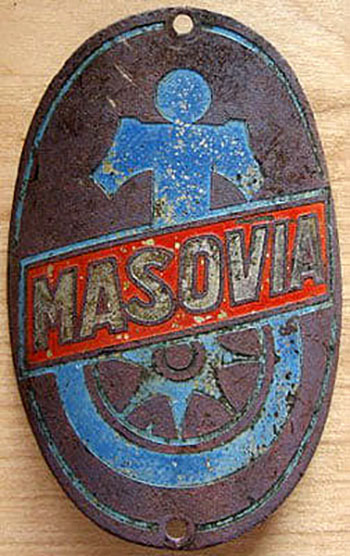
In 1933, Franz Todtenhöfer registered a new bicycle brand, "Mazovia". "Mazovia" was the name of one of the student corporations of the Albertina University, of which Franz Todtenhöfer was a member. Thus, "from under the pen" of the entrepreneur came both the bicycle brands he founded himself, and, apparently, "Baltia", which he bought from Althoff and Politt. In addition to bicycles themselves, various components for them were also traded: tubes, tires, lights, chains, frames, seats, pedals, bells, etc. Some of these products were manufactured by third-party manufacturers, and then the "Mazovia" mark was applied to them. Up to 3,000 bicycles were manufactured per month.
Every year Franz Todtenhofer invited all employees of his organization to a bike ride from Königsberg to Gross-Heidekrug (now the village of Vzmor'e in the Svetlovsky urban district). Such events always ended in a restaurant, to which the families of the employees arrived by ship. For obvious reasons, after the feast, the employees and their families set off on the return trip by ship.
There is no information about Todtenhöfer's fate during the storming of Königsberg and after the capitulation of Germany. But already in 1946, Franz Todtenhöfer found himself in Berlin. Despite his 70 years of age, he started a new business there. A shop and factory for the production of bicycles and parts for them were registered in house No. 14 on Schillerstrasse. In 1952-1953, his company was engaged only in the wholesale of spare parts and accessories for bicycles.
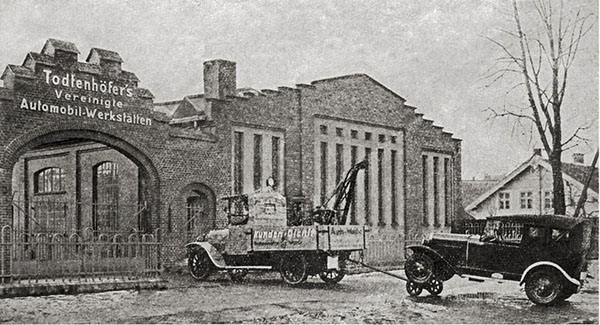
Franz Todtenhöfer died on March 22, 1955 in Berlin. This is the life story of a man who dedicated his creative career to the development of cycling in East Prussia.
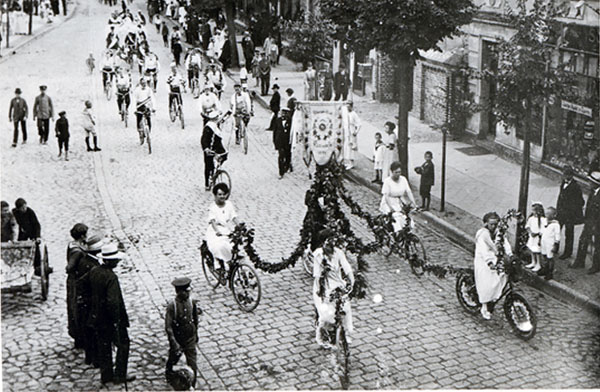
It remains to add that bicycles were sold in many cities of East Prussia. They can be seen on postcards and numerous pre-war photographs. It is safe to say that bicycle traditions have not been lost in today's Kaliningrad, as evidenced by the thousands of fans of two wheels who take part in the annual "Tour de Kranz" bicycle race from Kaliningrad to Zelenogradsk and back.
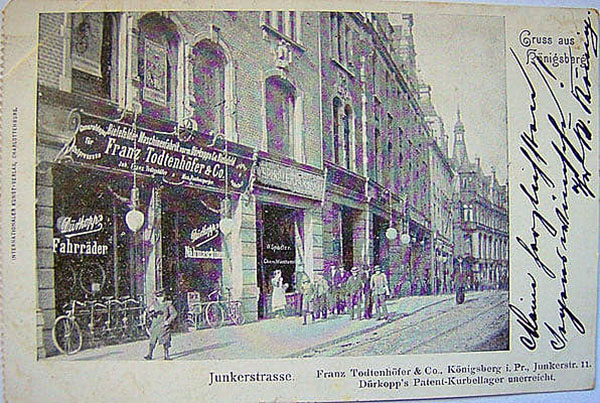
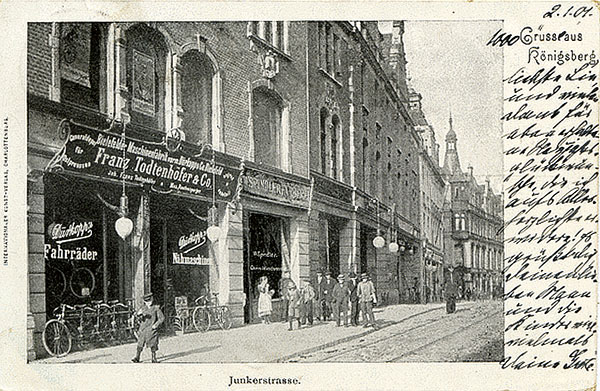
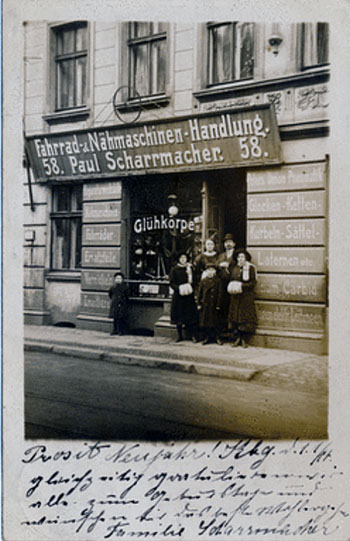
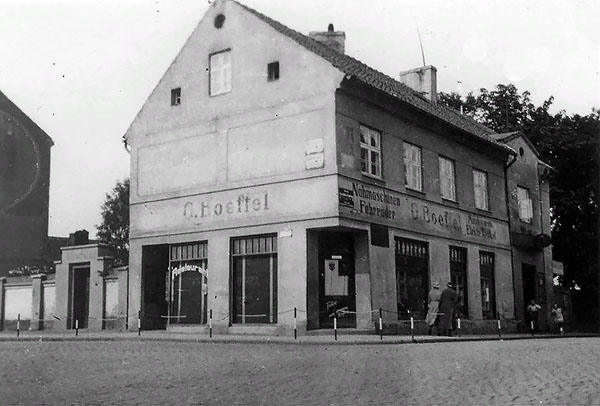
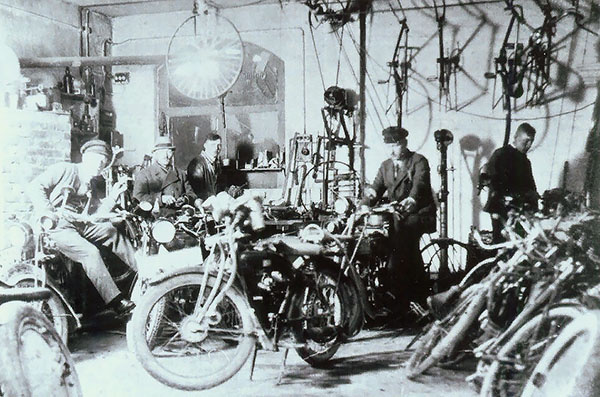
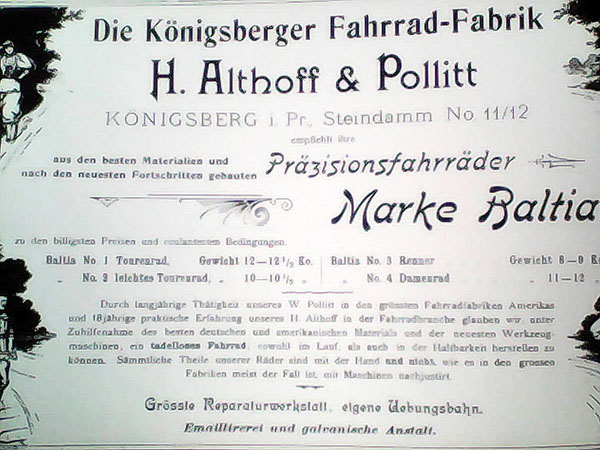
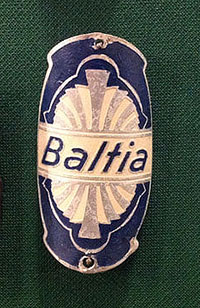
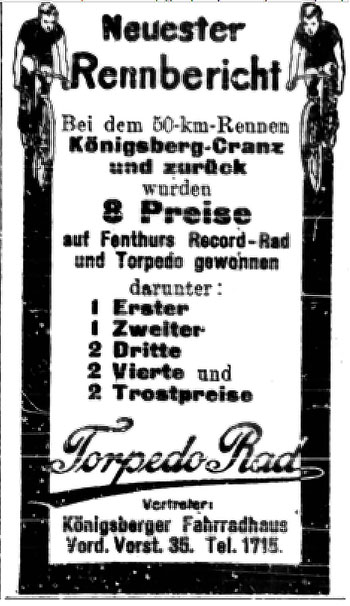
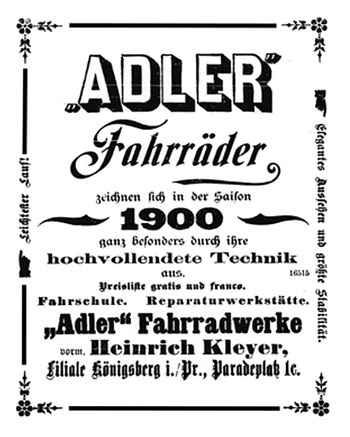
Owners of bike shops selling bicycles of various brands ordered nameplates for advertising, as well as tools and bells.
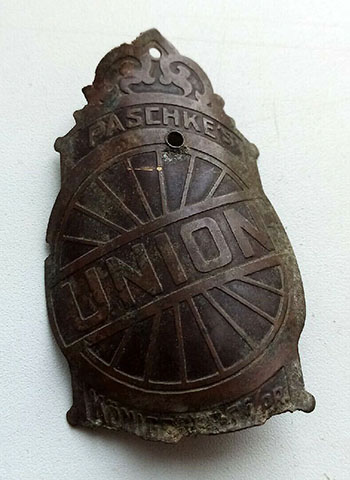
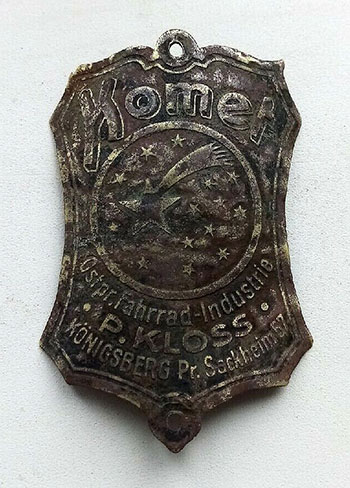
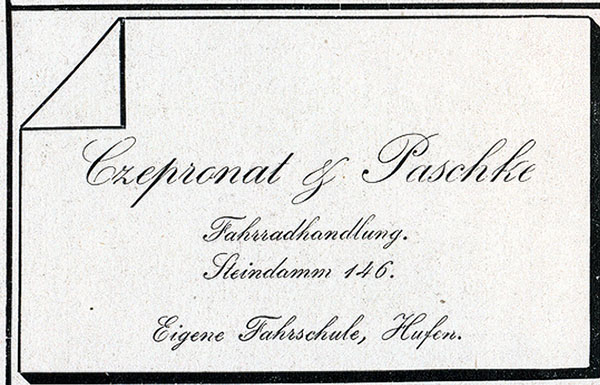
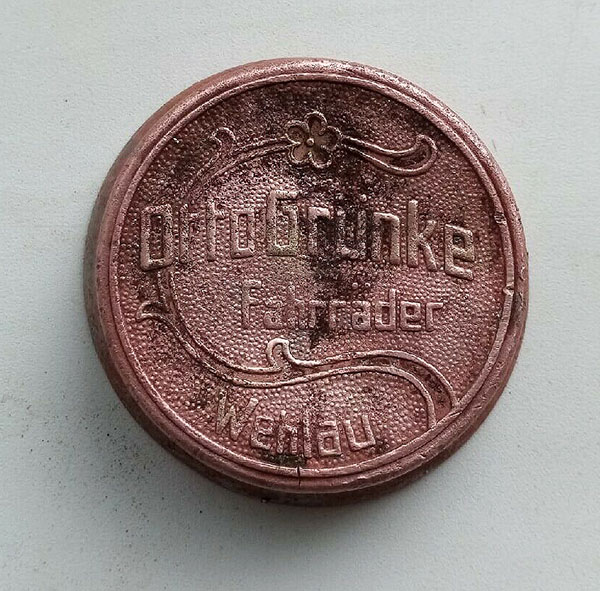
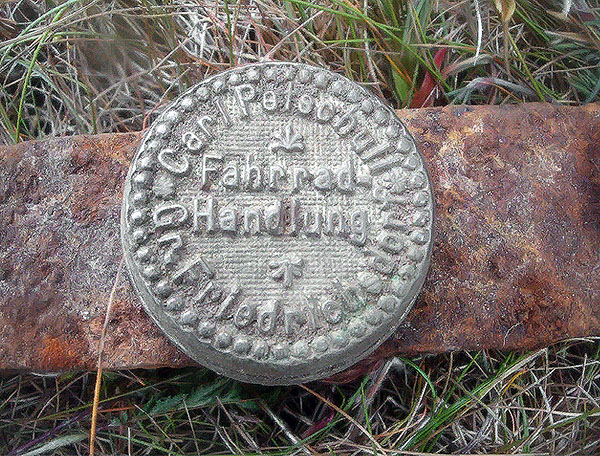
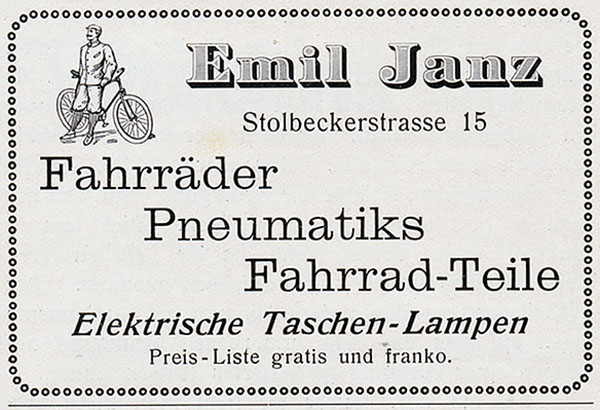
Sources:
Krinke A. Immerse yourself in the dark. A Chronicle of Todtenhöfer AG – The Knockout Room, No. 62, 2/2016
Address of the Main and Residential Area of Koenigsberg i. Pr. and the return. 1899.
Address of the Main and Residential Complex of Koenigsberg in Preußen and its annexes since 1901.
